高中英语情态动词详解(强推)上课讲义
- 格式:ppt
- 大小:2.15 MB
- 文档页数:33



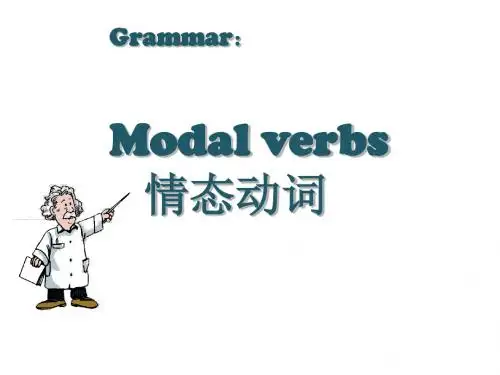
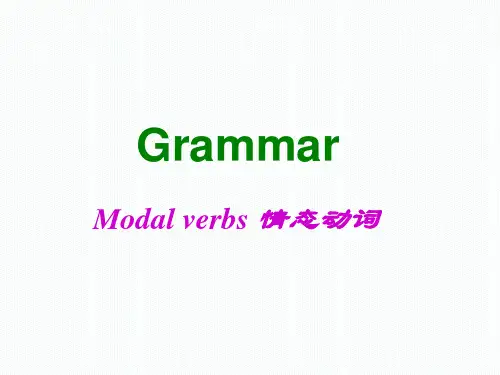
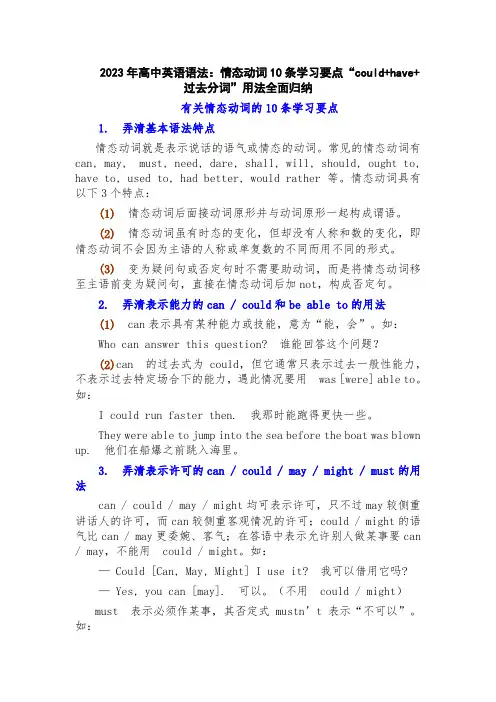
2023年高中英语语法:情态动词10条学习要点“could+have+过去分词”用法全面归纳有关情态动词的10条学习要点1. 弄清基本语法特点情态动词就是表示说话的语气或情态的动词。
常见的情态动词有can, may, must, need, dare, shall, will, should, ought to, have to, used to, had better, would rather等。
情态动词具有以下3个特点:(1)情态动词后面接动词原形并与动词原形一起构成谓语。
(2)情态动词虽有时态的变化,但却没有人称和数的变化,即情态动词不会因为主语的人称或单复数的不同而用不同的形式。
(3)变为疑问句或否定句时不需要助动词,而是将情态动词移至主语前变为疑问句,直接在情态动词后加not,构成否定句。
2. 弄清表示能力的can / could和be able to的用法(1)can表示具有某种能力或技能,意为“能,会”。
如:Who can answer this question? 谁能回答这个问题?(2)can 的过去式为could,但它通常只表示过去一般性能力,不表示过去特定场合下的能力,遇此情况要用was [were] able to。
如:I could run faster then. 我那时能跑得更快一些。
They were able to jump into the sea before the boat was blown up. 他们在船爆之前跳入海里。
3. 弄清表示许可的can / could / may / might / must的用法can / could / may / might均可表示许可,只不过may较侧重讲话人的许可,而can较侧重客观情况的许可;could / might的语气比can / may更委婉、客气;在答语中表示允许别人做某事要can / may,不能用could / might。


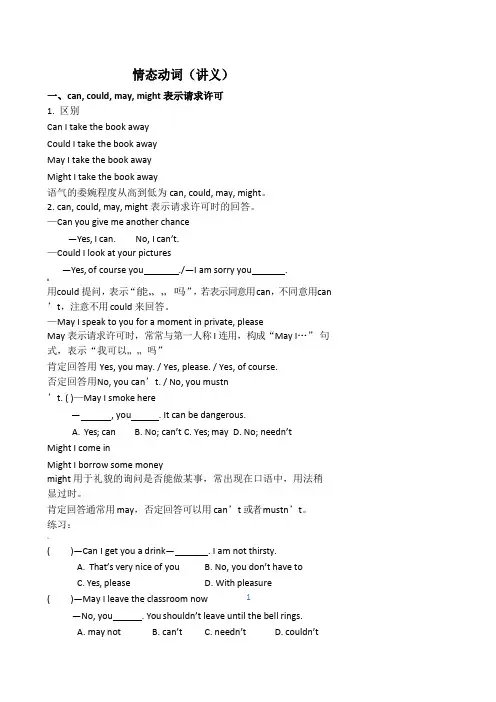
情态动词(讲义)一、can, could, may, might 表示请求许可1.区别Can I take the book awayCould I take the book awayMay I take the book awayMight I take the book away语气的委婉程度从高到低为 can, could, may, might。
2.can, could, may, might 表示请求许可时的回答。
—Can you give me another chance—Yes, I can. No, I can’t.—Could I look at your pictures—Yes, of course you ./—I am sorry you .#用c ould 提问,表示“能……吗”,若表示同意用 can,不同意用c an ’t,注意不用 could 来回答。
—May I speak to you for a moment in private, pleaseMay 表示请求许可时,常常与第一人称 I 连用,构成“May I…”句式,表示“我可以……吗”肯定回答用 Yes, you may. / Yes, please. / Yes, of course.否定回答用N o, you can’t. / No, you mustn’t. ( )—May I smoke here—, you . It can be dangerous.A.Yes; canB. No; can’tC. Yes; mayD. No; needn’tMight I come inMight I borrow some moneymight 用于礼貌的询问是否能做某事,常出现在口语中,用法稍显过时。
肯定回答通常用 may,否定回答可以用 can’t 或者 mustn’t。
练习:~( )—Can I get you a drink—. I am not thirsty.A.That’s very nice of youB. No, you don’t have toC. Yes, pleaseD. With pleasure ( )—May I leave the classroom now 1—No, you . You shouldn’t le ave until the bell rings.A. may notB. can’tC. needn’tD. couldn’t( )—you pass me a pen I’d like to write down the telephone number.A. NeedB. CouldC. MustD. Should ( )—Could I use your eraser for a while—Yes, of course you .A. couldB. willC. canD. should二、情态动词和短语情态动词1.情态动词needThe little girl needs to get some sleep.I needed two more days to finish thework. Do you need to have some coffeeneed 作实义动词,有人称,时态的变化。
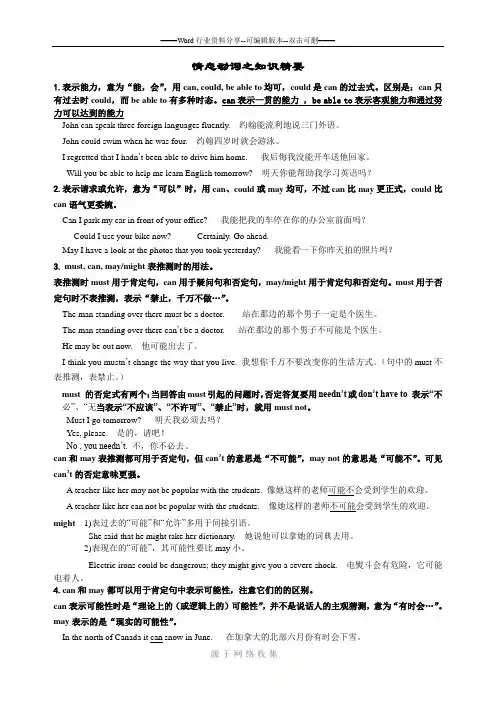
情态动词之知识精要1.表示能力,意为“能,会”,用can, could, be able to均可,could是can的过去式。
区别是:can只有过去时could,而be able to有多种时态。
can表示一贯的能力,be able to表示客观能力和通过努力可以达到的能力John can speak three foreign languages fluently. 约翰能流利地说三门外语。
John could swim when he was four. 约翰四岁时就会游泳。
I regretted that I hadn’t been able to drive him home. 我后悔我没能开车送他回家。
Will you be able to help me learn English tomorrow? 明天你能帮助我学习英语吗?2.表示请求或允许,意为“可以”时,用can、could或may均可,不过can比may更正式,could比can语气更委婉。
Can I park my car in front of your office? 我能把我的车停在你的办公室前面吗?----Could I use your bike now? ---Certainly. Go ahead.May I have a look at the photos that you took yesterday? 我能看一下你昨天拍的照片吗?3. must, can, may/might表推测时的用法。
表推测时must用于肯定句,can用于疑问句和否定句,may/might用于肯定句和否定句。
must用于否定句时不表推测,表示“禁止,千万不做…”。
The man standing over there must be a doctor. 站在那边的那个男子一定是个医生。
The man standing over there can’t be a doctor. 站在那边的那个男子不可能是个医生。
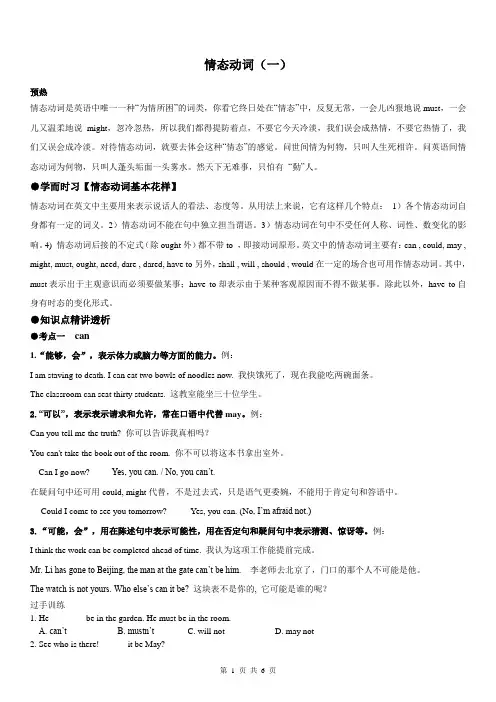
情态动词(一)预热情态动词是英语中唯一一种―为情所困‖的词类,你看它终日处在―情态‖中,反复无常,一会儿凶狠地说must,一会儿又温柔地说might,忽冷忽热,所以我们都得提防着点,不要它今天冷淡,我们误会成热情,不要它热情了,我们又误会成冷淡。
对待情态动词,就要去体会这种―情态‖的感觉。
问世间情为何物,只叫人生死相许。
问英语间情态动词为何物,只叫人蓬头垢面一头雾水。
然天下无难事,只怕有―勤‖人。
●学而时习【情态动词基本花样】情态动词在英文中主要用来表示说话人的看法、态度等。
从用法上来说,它有这样几个特点:1)各个情态动词自身都有一定的词义。
2)情态动词不能在句中独立担当谓语。
3)情态动词在句中不受任何人称、词性、数变化的影响。
4) 情态动词后接的不定式(除ought外)都不带to ,即接动词原形。
英文中的情态动词主要有:can , could, may , might, must, ought, need, dare , dared, have to另外,shall , will , should , would在一定的场合也可用作情态动词。
其中,must表示出于主观意识而必须要做某事;have to却表示由于某种客观原因而不得不做某事。
除此以外,have to自身有时态的变化形式。
●知识点精讲透析●考点一can1.“能够,会”,表示体力或脑力等方面的能力。
例:I am staving to death. I can eat two bowls of noodles now. 我快饿死了,现在我能吃两碗面条。
The classroom can seat thirty students. 这教室能坐三十位学生。
2.“可以”,表示表示请求和允许,常在口语中代替may。
例:Can you tell me the truth? 你可以告诉我真相吗?You can't take the book out of the room. 你不可以将这本书拿出室外。
英语语法-情态动词和虚拟语气[高考考查分析]全国卷的语法填空近几年没有考查情态动词的题目,这应该与题型特点有关,并不能说明可以忽视情态动词的学习。
有些自主命题省份的试卷的单项填空题涉及对此项考点的考查。
[调取储备知识]1.情态动词的基本用法情态动词用法can/could (1)表示能力,意为“能、会”。
can可用于肯定句、疑问句或否定句。
could主要用于过去时。
(2)表示客观的可能性,主要用于否定句和疑问句。
当表示一时的可能或理论上的可能时,可用于肯定句。
如:The temperature can fall to-200℃,that is 200℃ below freezing.(3)表示允许、许可。
在口语中can可以代替may表示许可,而may比较正式。
如:Can(May)I do it?(4)表示请求。
could可以代替can,表示语气更委婉,答语中用can。
如:—Could I borrow your dictionary?—Yes,of course/you can(may)/help yourself.(5)表示惊异、怀疑、不相信。
主要用于否定句、疑问句和感叹句。
如:How can you be so careless?may/might (1)表允许或请求,might比may语气更委婉。
如:—May I watch TV after supper?—Yes,you may.(Yes,please/certainly)/No,you mustn't(may not/had better not).(2)表推测,意为“可能”,may用于肯定句和否定句中,might比may语气更加不肯定。
(3)表祝愿,用于祈使句中。
如:May you succeed!must (1)表主观需要,意为“必须”。
否定形式must not(mustn't)表示“不允许”“不准”“禁止”等。
在回答带有must的问句时,不用mustn't而用needn't或don't have to。
第10讲情态动词目录01 考情透视.目标导航 (2)02 知识导图.思维引航 (3)03 考点突破.考法探究 (3)考点一情态动词的基本用法知识点1 情态动词的基本含义和用法 (4)知识点2 情态动词+have done的用法 (8)考点二虚拟语气知识点1 if条件句的虚拟语气用法 (9)知识点2 (should)+动词原形的虚拟语气 (9)知识点3 虚拟语气特殊句式 (11)04真题练习·命题洞现1.真题实战 (11)2.命题演练 (12)考点一情态动词的基本用法知识点1 情态动词的基本含义和用法情态动词:本身具有一定的意义,用于表达说话人的情感态度、语气或主观设想。
情态动词不能独立作谓语,必须与动词原形一起构成谓语。
情态动词在特殊语境具有特殊含义(如:must“非得;偏要”,should“竟然”,shall用于第二、三人称表示警告、命令、威胁、允诺、规定等)是高考的热点和难点。
常见情态动词的基本用法是高考考查的重点。
必须根据具体语境判断使用相应的情态动词。
类别:1. 只作情态动词,如may, might, must, can等。
2. 既作情态动词又作实义动词,如need, dare。
3. 具有情态动词特征的动词词组,如have(had, has) to, used to, ought to。
4. 可做情态动词又可作助动词,如shall(should), will(would)。
一can/could的用法1.表示能力,could表示过去的能力。
That’s when APL can make a difference.(2021年上海卷听力)这就是APL能够发挥作用的时候。
How long can you balance on one leg?你单腿能站多久?2.表示可能(理论上或是逻辑上)。
He can't/couldn't have enough money for a new car.他不可能有足够的钱买一辆新车。
2021届新高考英语语法微专题培优复习情态动词与have done知识点总结与练习(含解析)情态动词在高考题中的考察非常直接,主要考察以下两方面:1、情态动词的本义2、情态动词与have done咱们今天先把简单的解决了,就是情态动词与have done。
这东西在考试里就俩方向,一个表示对过去的推测,一个表示对过去的虚拟。
注意,只要情态动词加了have done,一定表示“过去”的事。
1、表示对过去情况的推测must have done / can't have donecould have done / couldn't have donemight (may) have done / might (may) not have done三者的语气按照must — could — might的顺序依次递减,表示对于推测准确性的把握在逐步降低。
当然,在题目当中我们并不需要掌握三种语气的差异,只要观察题目中有没有出现推测的证据,或者证据是否确凿,即可作出语气强或弱的判断。
有证据,就强;没证据,就弱。
2、表示对过去情况的虚拟should have done本应该责备语气shouldn't have done本不应该责备语气could have done本可能遗憾/惋惜语气couldn't have done本不可能意外/惊喜语气needn't have done本不必多余/不必要语气表示虚拟时,句中一定可以加入“本来……”这样的口吻。
请注意,每种虚拟都有自己的使用场合,进而传达出在该场合下需要体现的语气和态度。
把两方面合并在一起,我们就会发现,情态动词+have done的结构,其实可以这样来方便记忆:must / might (may) 推测+could 推测/虚拟+should / need 虚拟must和might肯定是推测,should和need肯定是虚拟,只有could一个同时身兼两种功能,所以遇到的时候要注意判断。